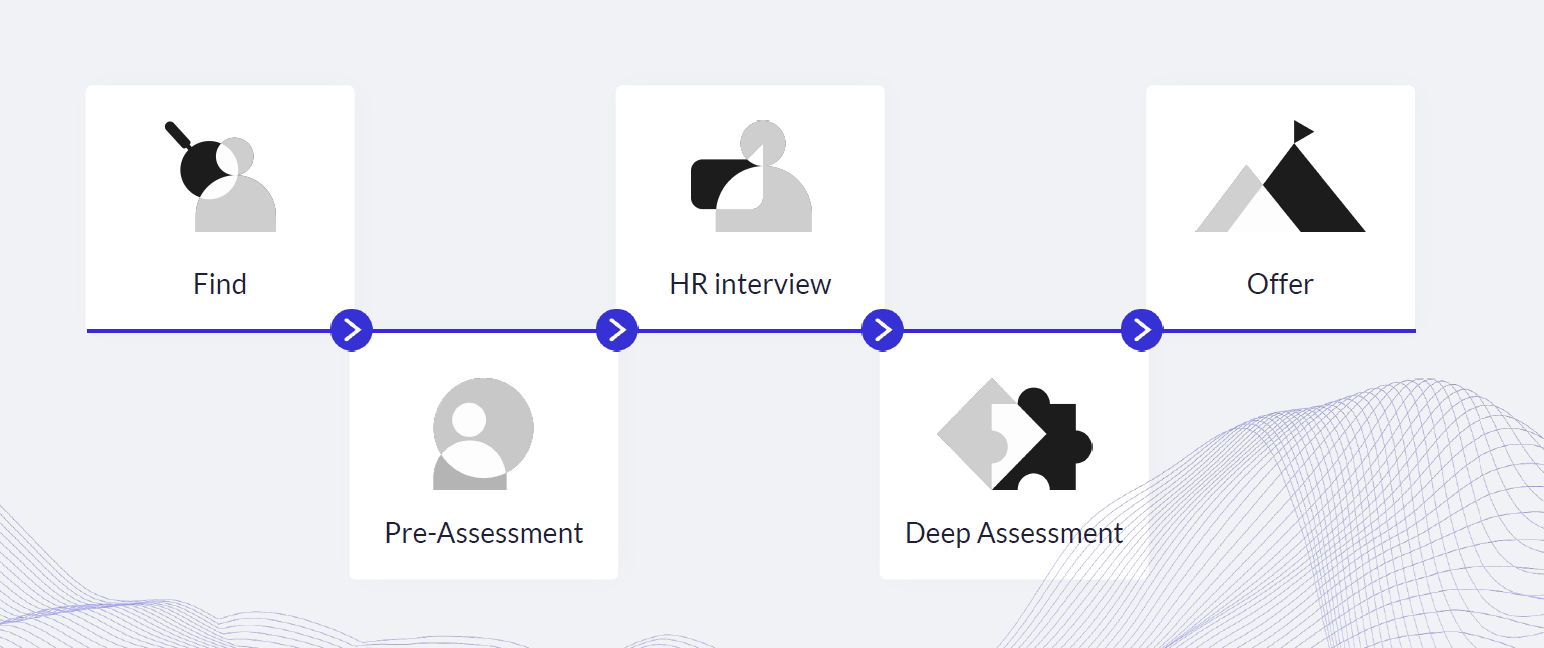Why tech assessment pays off: Insights for successful tech recruiting

Tech recruiting has become a major challenge for both HR and Tech departments. It can be difficult, slow and costly. When your company is not able to fill open tech positions an unavoidable ripple effect occurs; projects are halted, progression is slowed and keeping up with technological change and digitalisation is close to impossible.
Pre-pandemic there were 124.000 unfilled tech vacancies in Germany alone. At the same time it takes on average 180 days to fill an open tech position in Germany, according to a study up to 40 hours can be spent by tech teams to hire one software engineer, as technical assessments/interviews are usually conducted by senior tech team members. This means that besides the direct costs (decent salaries of senior tech team members) there are also high opportunity costs. If you invest 30 to 40 hours in technical assessment this also means that it is 30 hours that you didn't invest in driving your own product.
This doesn’t mean that it’s not worth investing time in the assessment- it’s quite the opposite!
In this article, we will explain the importance of technical assessment, the challenges that come with it and share our learnings.
Here is an overview of the ‘typical’ tech recruitment process:

First you find a candidate through analysing CVs/profiles. Once a promising CV has been selected it is reviewed to confirm whether it is a suitable fit for the open job description (pre-assessment). If this is the case, the next step will be an HR interview. Then there should be a deeper assessment to understand if the candidate has the expertise needed to fulfil the position. Finally, there is an offer. With the overall current hiring process clarified, let's have a closer look at the stages of pre-assessment and the deep assessment.
Pre-Assessment
The initial skill review is critically important to understand whether or not you want to move on with a certain profile.
We at expertlead work with a lot of businesses in Europe and have made our observations on how these companies handle this part of the hiring process. What we observed is that pre-assessment is typically done by manually matching the job description and with CV information e.g. current position, level of seniority/experience, former employers or number of years of experience with specific technology. But is a criteria like years of experience the right metric to guarantee the candidates fit? And if so, how many years would be a good scale? As you can see, one of the big challenges here is to really understand what is the right metric to focus on.
Also it should be kept in mind that every CV is a form of self-marketing and can be “misleading” or let’s say embellished. Hence why previous work examples can be more meaningful than a self written CV.
Challenges:
- Potential waste of candidate’s time
- Tech CVs can be tough to make sense of for non-techies; are years of experience the right metric?
- CVs can be inaccurate - actual work can be difficult to check by HR (e.g.GitHub)
- CV reviewing can be time consuming
So what can your company do in order to improve the pre-assessment phase?
Pre-assessment can be upgraded by setting more of a focus on it and adjusting the process:
Do not (only) look at years of experience
The number of years of experience with a certain technology, taken from the CV, is one data point to look at, but it is no good predictor of performance and skill level.
Screen & evaluate previous work
Check pieces of work/lines of code as thoroughly as possible - it communicates a lot more than any CV can.
Loop in the tech team early on
The tech team can provide early feedback on selected profiles or previous work, making sure to only talk to proceed with fitting candidates.
Define metrics & thresholds
The pre-assessment starts with setting up the job description with the Tech team. Define must-have metrics & thresholds in order to avoid subjective biases in profiles & CVs.
In order to automate the pre-assessment phase, we at expertlead have built a tool that aggregates data from a large variety of platforms such as Xing, Github, stackoverflow, kaggle etc. We try to make sense of the data we collect, which is for instance publicly available pieces of work or lines of code. With our software we have access to millions of profiles and a lot of data points. Based on the automated pre-assessment we can rank the candidates profiles. The advantage of our tool is gaining the ability to target the right people.
Deep Assessment
Research shows that there are still a large number of companies who don’t do a deep tech assessment at all, yet if the deep assessment is done well it enhances the probability of finding the right candidate which, in turn increases the likelihood of multiple years of employment. There are several ways you can do the deep tech assessment i.e. home assignments (inhouse or via an external provider), live technical Q&A and coding.
According to a Stackoverflow survey only 39% of developers had to write code in the last successful recruitment process. This is consistent with the hackerrank data which says that 41% of companies use technical skill assessments in source or screening phase. Not doing it or not doing it right can lead to the following challenges:
Challenges:
- If not done right/at all: High costs associated with skill misfit. Slows progress of projects and dissatisfaction from within the team
- Inhouse expertise required for technical assessments
- Significant time investment of most senior Tech team members for in-depth candidate assessment
- Take-home assignments can be repetitive for candidates and difficult to customize for specific roles
Our Learning: Solving a real-life problem together with the candidate is the most insightful assessment, so here are our Tips.
Code with your candidate
There is no more insightful assessment than understanding the thought process of a candidate and the way they implement a solution.
Do not rely on one judgment only
A hiring decision should not be made by one person only. Different interviewers with different styles can observe different points, and the candidate will want to meet the team as well.
Define metrics & thresholds
As in the pre-assessment stage, it is essential to define what dimensions are being looked at, how they can be quantified, and what rating will be used - especially when you use several interviewers.
Tailor the assessment
The closer an assessment is to the real-life challenges the candidate will need to solve, the more insightful & fun the assessment is - for both the employer and the candidate.
Our approach: How does expertlead asses deep tech?
We at expertlead leverage our community of experienced tech experts to create and conduct assessments via a Peer-to-Peer interview. So let’s say we want to test a tech candidate (for instance an angular developer, java script) - either because he wants to join our community or because a customer wants us to test his/her skills, we will find a angular experienced engineer in our community who will do the interview with that candidate.
Advantages of the Technical Peer-to-Peer Interviews
- Tech experts from expertlead’s community conduct in-depth technical assessments
- Conversation among peers at eye level
- Live coding exercise & technical Q&A
- 25+ (sub-)dimensions can be quantified
- Interviewers from all over the globe
- 24/7 availability, fully remote interview
- Recorded interviews for quality assurance
The beauty of this approach is that both sides, the candidate and the interviewer have the knowledge for a deeper conversation - and no matter if the interview results in a hiring- both sides will benefit.
After the deep tech assessment is the final stage of the recruiting journey: The Offer.
What we observe in the Tech market is that usually one out of two offers will be rejected. This is the worst case scenario, because you have gone through the entire process, invested time and money and then your offer is not accepted. This will always be a risk, but there are tactics that can be implemented which have been proven to increase a candidate's satisfaction with the process. When developers are asked what influences them to accept one offer over another it’s not the money, not even the flexible working hours or the work-life-balance it is the technical challenge.
A job offer will only be accepted if the technical challenge seems interesting enough
The fact that for techies the most important thing is to learn something and develop, underlines the importance of the tech assessment within the whole recruiting process.
Alongside the technical aspect it is important to emphasise the effect of a good candidate experience. Read our article to learn more about the impact of the candidate experience in the tech recruiting process.
Candidates want to join a tech company that moves fast and cares about people
Now that we have dealt with the topic of tech assessment in detail, we would like to give you a few final tips.
Be as “techie” as you can be
Candidates’ #1 reason to accept a job offer is an exciting technical challenge. Make sure the candidate has a chance to see & understand in detail what issue needs to be solved.
Be human
The candidate will join a team. The more pleasant the interviews & assessments are, the better the company culture will look like. Any candidate should be able to meet several team members.
Be fast
Great candidates land multiple offers. And there are many great companies & challenges out there. A fast process with no frictions & breaks in between increases your chances.
Provide detailed feedback
Candidates want to learn - even during a process. If a candidate is not good enough today, they can still be good enough tomorrow - and then you want them to apply again.
We hope you can apply the points made in the article to your own company and your tech recruiting process. If you want to outsource the technical assessment, please contact the expertlead team, we will be happy to advise you!
Aug 2021 - 8 min read

Katharina Höll
Senior Communications Manager
